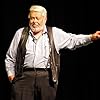Mary
asked
David Joy:
I enjoyed your book Where all Light Tends to Go. I am confused, however, by the last sentences. "That restful time was near now, and I finally understood that there'd never been any difference between here or there." "Only the middle ground of this wicked world mattered, the vast gap that stretched between, and those who were born with enough grit to brave it. Will you please explain? Many thanks.
David Joy
This answer contains spoilers…
(view spoiler)[I'm typically not one to give definitive explanations as I think that's one of the most beautiful things about books, that individual illumination and self discovery. But I think in this case those lines are pivotal in understanding what I wanted that final scene and final image to do, so here goes...
I think that when we look at points in a person's life, two major points are current location and destination, where are we right now and where do we want to go. Jacob has always been someone tied to the life he was born into. For his entire life, he's been immobilized by circumstance. He's very cognizant of this and he can easily see where he is because of who he is--going all the way back to that opening paragraph, "I was a McNeely and in this part of Appalachia that meant something."--just as he can see where he would go if he could be anything he wanted. So we've got two points: here and there. Again, going back to the beginning, Jacob has always been aware that it's his own fears and insecurities that have kept him tied to that place and that life (from Chapter One): "What was disappointing about that school, my life, and this whole fucking place was that I'd let it beat me. I'd let what I was born into control what I'd become. Mama snorted crystal, Daddy sold it to her, and I'd never had the balls to leave." In the words of Jacob, "That was [his] life in a nutshell."
So at the end of the novel, it's that same central conflict. Jacob can see where he is and where he wants to go. He has two choices. He can stay in that house and let the officers take him and let the world once again decide what his life will become. Or, for once, he can gather the strength and courage to make that decision for himself. That's what he does. He walks into the gunfire because leaving that wicked world behind seems braver than bearing it.
Ultimately what I'm trying to say is that the same truth holds for all of us. Each of us have a current location and a destination. The only difference between those two points is the space between and yet so many stay shackled to exactly where they've been their entire lives because they're too goddamned scared to take a chance. We fear the middle ground between those two points. We fear change and so we settle for the safety and security of staying put. It takes an act of bravery to walk into that "vast gap" where we don't know what will happen. It takes an act of bravery to know exactly what you want and to walk fearlessly into the in-between with a confidence and pride that nothing can stop you but yourself. Jacob does just that. And as sad as that ending may be, as misdirected as he may have been in choosing that destination, I think there's a lot to be learned in how fearless he was in that moment. (hide spoiler)]
I think that when we look at points in a person's life, two major points are current location and destination, where are we right now and where do we want to go. Jacob has always been someone tied to the life he was born into. For his entire life, he's been immobilized by circumstance. He's very cognizant of this and he can easily see where he is because of who he is--going all the way back to that opening paragraph, "I was a McNeely and in this part of Appalachia that meant something."--just as he can see where he would go if he could be anything he wanted. So we've got two points: here and there. Again, going back to the beginning, Jacob has always been aware that it's his own fears and insecurities that have kept him tied to that place and that life (from Chapter One): "What was disappointing about that school, my life, and this whole fucking place was that I'd let it beat me. I'd let what I was born into control what I'd become. Mama snorted crystal, Daddy sold it to her, and I'd never had the balls to leave." In the words of Jacob, "That was [his] life in a nutshell."
So at the end of the novel, it's that same central conflict. Jacob can see where he is and where he wants to go. He has two choices. He can stay in that house and let the officers take him and let the world once again decide what his life will become. Or, for once, he can gather the strength and courage to make that decision for himself. That's what he does. He walks into the gunfire because leaving that wicked world behind seems braver than bearing it.
Ultimately what I'm trying to say is that the same truth holds for all of us. Each of us have a current location and a destination. The only difference between those two points is the space between and yet so many stay shackled to exactly where they've been their entire lives because they're too goddamned scared to take a chance. We fear the middle ground between those two points. We fear change and so we settle for the safety and security of staying put. It takes an act of bravery to walk into that "vast gap" where we don't know what will happen. It takes an act of bravery to know exactly what you want and to walk fearlessly into the in-between with a confidence and pride that nothing can stop you but yourself. Jacob does just that. And as sad as that ending may be, as misdirected as he may have been in choosing that destination, I think there's a lot to be learned in how fearless he was in that moment. (hide spoiler)]
More Answered Questions
Gary
asked
David Joy:
David, there is a slight chance that you may remember my mentioning that the end of your novel reminded me of the end of Jim Thompson's "The Killer Inside Me," in which the narrator makes a similar choice. Do you remember this discussion? It was before the book was published, but I had an "advance copy." I am not sure that I remember my own reasoning now, but it may be that Thompson's protagonist had a different mo
About Goodreads Q&A
Ask and answer questions about books!
You can pose questions to the Goodreads community with Reader Q&A, or ask your favorite author a question with Ask the Author.
See Featured Authors Answering Questions
Learn more





May 16, 2016 10:32AM · flag
Jan 04, 2017 09:27PM · flag